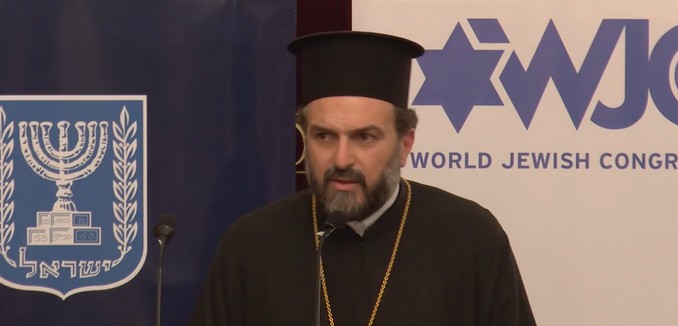In testimony (embedded below) before the United Nations Human Rights Council (UNHRC) in Geneva, Switzerland on Wednesday, an Arab-Israeli priest, Father Gabriel Naddaf, told the council that Israel was the “only safe place” for Christians in the Middle East.
Naddaf presented his testimony on behalf of the NGO UN Watch, which provided a transcript of his remarks:
Do you know that at the start of the 20th century, Christians comprised 20% of the population of the Middle East?
Today they comprise only 4%. …
Christians in the Middle East are marginalized; their rights denied, their property stolen, their honor violated, their men killed, and their children displaced.
Where will they go? Who will defend them? And who will guard their property?
If we look at the Middle East, Mr. President, we realize there’s only one safe place where Christians are not persecuted. …
It is Israel, the country I live in.
In Towards a Zionism of Inclusion, which was published in the September 2014 issue of The Tower Magazine, Einat Wilf observed:
In the past, Israeli Christians by and large adopted Arab and Palestinian identities. Christians were among the most important thinkers and shapers of modern Arab and Palestinian nationalism, and often its most zealous adherents. This is due, in part, to their status as a minority among Arab Muslims. In recent years, however, as the Arab Spring revolutions have placed the lives of Middle Eastern Christians in jeopardy, Israeli Christians have begun to explore the possibility of an Israeli rather than Arab Christian identity. As Arab identity is increasingly perceived as exclusively Muslim and even openly hostile to Christians, Israeli identity has emerged as a new possibility for identification. Like the Druze and Bedouin, this is being explored through service in the IDF, as more and more voices in the Christian community look to military service as a means of engaging with “their state.” In response, the IDF is taking steps to make military service more accessible. This process has only just begun and is politically controversial, but it demonstrates again that Zionism is willing and capable of integrating non-Jews who do not embrace a competing identity hostile to Zionism.
[Photo: ShalomYerushalayim1 / YouTube ]




